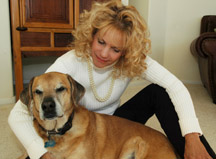If this is even partially true, it is an astonishing statement.
The case to definitively establish the link between mind and body was opened almost 1,500 years ago when Hippocrates wrote that a person might yet recover from his or her belief in the goodness of the physician. It was continued in 1912 when one doctor reported that tuberculosis patients who had previously been on the mend, when given bad news (e.g., that a relative had passed away) took sudden turns for the worse and died. And today the data supporting the connection between thoughts and health, indeed between mental images and survival, are mounting.
Brain scans have shown that when we imagine an event, our thoughts � ??light up� ? � the areas of the brain that are triggered during the actual event. Sports psychologists conducted one study in which skiers were wired to EMG machines and monitored for electrical impulses sent to the muscles as they mentally rehearsed their downhill runs. The skiers' brains sent the same instructions to their bodies whether they were doing a jump or just thinking about it.
What does this mean for a person out in the mountains who suddenly finds himself stuck in a downpour and unable to get out before dark when the temperature is expected to fall nearly 40 degrees? How does this help someone with an asthma attack in the middle of a lake or a person with a broken leg one hour from the nearest ranger station? How does this help a rock scrambler or skier have the performance of a lifetime and keep themselves calm and healthy?
What Verbal First Aid(tm) proposes is that words and the intentions behind them can mean the difference between life and death. Based on the simple notion that the words we say (to ourselves and to one another) do matter, that they affect us both physically and mentally, there are ways to speak that make those words healing, no matter what the situation. By saying the right words in the right way we are able to speak directly to the body, reduce an inflammatory response, help to slow down or stop bleeding, change the way an event is interpreted so that it is experienced differently IN the body.
What Can We Do, What Can We Say: Verbal First Aid in Real Life
Deepak Chopra begins to answer that last question when he uses the metaphor of two people in a roller coaster. The following example is an adaptation and elaboration of his story:
Two people are getting into a roller coaster. One is a young cowboy� ??hardly moving off the platform yet, but his arms are already in the air and he's hootin' and hollerin' with anticipation. His heart is pounding. He's smiling. The woman next to him has her hands clamped down onto the metal rod in front of her. Her heart is pounding but she is not smiling. Both are in the same seat, on the same ride, but they are clearly not experiencing the same thing. The difference? Their thoughts.
The young cowboy in the roller coaster sees that the woman next to him is nervous. He turns to her. She looks to him, her eyes wide. She says, � ??How can you be so relaxed?� ? � He smiles, points to his hat, � ??It's my magic hat.� ? � He takes it off his head and hands it to her. � ??You hold on to it while we ride, okay? It's easier to enjoy the ride when you know you've got magic with you.� ? � Her hands loosen their grip. She takes the hat. Tentatively, she smiles.
According to medical experts, anxiety (or fear) and pain are inextricably woven together for the vast majority of people. A great deal of human discomfort comes from our anticipation of it and our perception of it. Unfortunately, there is nothing marketed as vigorously in this country as is fear. If we're not scared to death by a headline, it's a radio report, a movie, a video game, or a television show. We're literally bombarded by images and ideas that promote fear. We are propelled by it and sold by it.
If the science is correct, the good news is that we can change it on every level� ??from the conscious to the autonomic. When we alter our thoughts, are soothed by a kind authority, or are assured that we are in good hands, we can begin to feel the changes in our bodies� ??the softening of muscle fiber, the opening of bronchial tubes, the quieting of pain, the start of healing.
This is why so much of Verbal First Aid in the field is directed to the alleviation of anxiety through the development and utilization of rapport. In rapport, a person will feel, � ??She understands me.� ? � � ??He is going to help me.� ? � � ??I'm safe, now.� ? � When we feel understood, our anxiety is reduced. And when anxiety is reduced, pain is relieved. Even if we are entirely alone, clinicians and scientists agree that what we say to ourselves matters and we can direct our thoughts so that our chances for survival are enhanced.
The Power of Rapport




